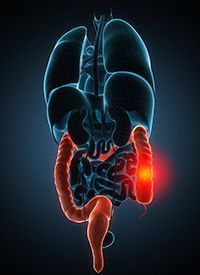Article
Encorafenib/Cetuximab ± Binimetinib Improves Survival Regardless of Age in BRAF V600E–Mutant mCRC
Author(s):
Treatment with either encorafenib plus cetuximab with or without binimetinib or standard chemotherapy each demonstrated comparable progression-free survival and overall survival in pretreated patients with BRAF V600E–mutated metastatic colorectal cancer.

Treatment with either encorafenib (Braftovi) plus cetuximab (Erbitux) with or without binimetinib (Mektovi) or standard chemotherapy each demonstrated comparable progression-free survival (PFS) and overall survival (OS) in pretreated patients with BRAF V600E–mutated metastatic colorectal cancer (mCRC), according to findings from a post-hoc subanalysis of the phase 3 BEACON CRC trial (NCT02928224) presented at the 2022 ESMO World Congress on Gastrointestinal Cancers.
Additionally, treatment with the targeted regimens demonstrated similar PFS benefits vs chemotherapy regardless of age, but showed only numerical improvements in OS in those younger than 50 years.
The hazard ratio for PFS regardless of age was 1.04 (95% CI, 0.71-1.53) for the triplet, 0.86 (95% CI, 0.56-1.34) for the doublet, and 1.24 (95% CI, 0.83-1.84) for the control. The hazard ratio for OS regardless of age was 0.92 (95% CI, 0.60-1.40), 0.63 (95% CI, 0.37-1.08), and 1.24 (95% CI, 0.85-1.80) for the triplet, doublet, and control, respectively.
Adults over the age of 50 years are the most likely to receive a diagnosis of CRC, but there has been a rise in CRC diagnoses in younger adults. Risk factors are not well defined for the younger population, and definitive evidence regarding outcomes and survival for this demographic are unclear.
Prior findings from BEACON demonstrated that encorafenib plus cetuximab with or without binimetinib improved PFS and OS and delayed declines in quality of life (QOL) compared with standard chemotherapy in previously treated patients with BRAF V600E–mutant mCRC.
To be eligible for the study, patients had to have BRAF V600E–mutant mCRC with disease progression following 1 or 2 prior treatment regimens; an ECOG performance status of 0 or 1; and no prior therapy with any RAF, MEK, or EGFR inhibitor.
Patients were randomly assigned to encorafenib plus binimetinib and cetuximab (n = 224); encorafenib and cetuximab (n = 220); or control consisting of FOLFIRI plus cetuximab, or irinotecan and cetuximab (n = 221).
The primary end points were OS in all randomized patients and objective response rate (ORR) per blinded central review between the triplet and control arms. Secondary end points included OS, ORR, PFS, safety, and QOL between the doublet and control arms, and the triplet and doublet arms.
The baseline characteristics among patients younger than 50 (n = 129) vs at least 50 years of age (n = 536) were well balanced with the exception of sex and location of the primary tumor. A total of 68 younger patients (52.7%) were male vs 245 (45.7%) among the older group. Additionally, 66 (51.2%) and 42 (32.6%) patients younger than 50 had a left-sided and right-sided primary tumor, respectively; these numbers were 164 (30.6%) and 313 (58.4%) in patients who were at least 50 years of age.
Additional findings indicated that among the younger cohort, the median PFS was 5.0 months (95% CI, 3.94-5.55) with the triplet (n = 47), 4.3 months (95% CI, 2.92-6.01) with the doublet (n = 33), and 1.5 months (95% CI, 1.05-1.58) with chemotherapy (n = 49). Among patients at least 50 years of age, the median PFS was 4.4 months (n = 177; 95% CI, 4.17-5.55), 4.3 months (n = 187; 95% CI, 4.04-5.52), and 1.6 months (n = 172; 95% CI, 1.48-2.20), respectively.
The median OS among patients under the age of 50 was 9.8 months (95% CI, 7.56-12.48) with the triplet, 10.3 months (95% CI, 7.26-not reached) with the doublet, and 5.4 months (95% CI, 3.75-8.90) with chemotherapy. Among patients at least 50 years of age, the median OS was 9.0 months (95% CI, 8.02-11.73), 8.8 months (95% CI, 7.89-11.24), and 6.4 months (95% CI, 5.09-7.39), respectively.
Regarding safety, the incidence and severity of adverse effects (AEs) were similar within treatment groups regardless of age. However, the rates of AEs leading to dose reduction or interruption were higher in patients at least 50 years of age vs those under the age of 50 regardless of treatment received.
Among patients younger than 50, AEs leading to dose reduction of any treatment occurred in 9 (19.1%), 3 (9.1%), and 9 (23.1%) patients in the triplet (n = 47), doublet (n = 33), and control (n = 39) arms, respectively. AEs leading to dose interruption of any treatment occurred in 28 (59.6%), 14 (42.4%), and 21 (53.8%) patients, respectively.
Among the older cohort, AEs leading to dose reduction of any treatment occurred in 63 (36.0%), 23 (12.6%), and 52 (33.8%) patients in the triplet (n = 175), doublet (n = 183), and control (n = 154) arms, respectively. AEs leading to dose interruption of any treatment occurred in 128 (73.1%), 96 (52.5%), and 86 (55.8%) patients, respectively.
Additionally, QOL was generally maintained and was similar between treatment arms for each age group.
Reference
Ng K, Ciardiello F, Van Cutsem E, et al. Evaluating age as a factor for survival and quality of life in patients with BRAF V600E-mutant metastatic colorectal cancer treated with encorafenib + cetuximab ± binimetinib: subanalysis of BEACON CRC. Ann Oncol. 2022;33(suppl 4):S372-S373. doi:10.1016/j.annonc.2022.04.435









